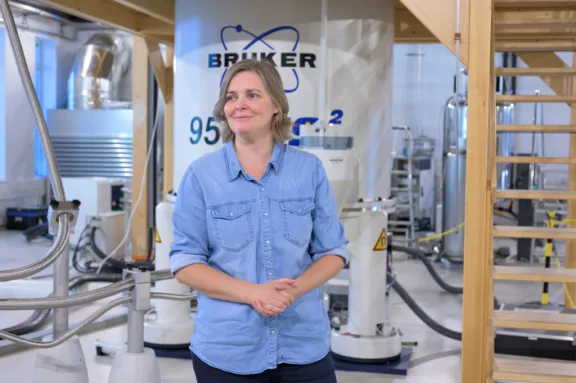Malene Jensen What if disorder is important for organizing signaling in cells?
Malene Jensen, CNRS research director, Institute of Structural Biology, Grenoble, France
- 2022 • Impulscience

Cells are continuously solicited by internal and external signals requiring a timely response. Nuclear magnetic resonance spectroscopy will allow Malene Jensen and her team to observe the details of how the task is organized in cells with extreme accuracy.
Scaffolding to organize signals in cells
Cells have efficient systems allowing them to turn internal and external signals into action. Cells transmit signals in groups of molecules that combine with each other. They can be pictured as a kind of relay leading to the signal’s effects. This is how, for example, a muscle cell can notice insulin in the blood and set up an appropriate response that will allow it to import glucose. The high number of proteins in cells can organize themselves to correctly and faithfully process the vast array of information they continuously receive. To do that, the right proteins must be combined in the right place at the right time to send the right messages. This feat is accomplished in part by so-called scaffolding proteins, which serve as platforms for physically grouping the various components of a signaling pathway.
The messy life of scaffolding proteins
Scaffolding proteins are a very diverse group, but they share one thing in common: "disordered" areas in their molecular structure. This is a real challenge: they are so dynamic that it is hard to understand their function with the technology used to study other proteins with a more "ordered" structure. The molecular details underlying the function of scaffolding proteins are still very hard to understand.
Finding the modus operandi of disordered proteins
Malene Jensen's team is interested in a particular signaling pathway, JNKs, and the scaffolding proteins composing it. JNK pathways intervene in stressful situations in cells, such as UV exposure or inflammation, and organize responses such as cell proliferation or death. Impulscience supports the project, which aims to obtain a complete blueprint of the function of two scaffolding proteins in the JNK signaling pathway: POSH and JIP1. Nuclear magnetic resonance (NMR) spectroscopy lies at the heart of the project. It is the only technology that can provide an atomic resolution glimpse into the structural, dynamic and functional details of scaffolding proteins. It can be used not only to study the structure of POSH and JIP1 but also how they interact with other proteins in the JNK signaling pathway and combine with each other to form a super-scaffold complex. The study could revolutionize the current view of the function of scaffolding proteins. Studying cell signaling mechanisms is particularly relevant because the deregulation of many signaling pathways is associated with diseases such as cancer and metabolic disorders.
Malene Jensen in a few words
Malene Jensen, chemist, received her PhD from the University of Copenhagen (Denmark) in 2006. She has extensive experience in using NMR to study protein structure and dynamics, especially proteins with disordered areas (intrinsic disorder). Her work has contributed to understanding the role of intrinsic disorder in various biological systems, such as the measles virus, and in certain proteins associated with neurodegenerative diseases. She joined the CNRS in 2010, and, with her team in Grenoble, contributes to understanding the role of proteins’ conformational dynamics involved in the life cycles of temperate bacteriophages. She also applies innovative NMR and X-ray crystallography methods to map the dynamics of disordered proteins in combination with their partners, illustrated by the JNK signaling pathway’s proteins. In 2015 she received the CNRS Bronze Medal for her contributions to her field of research.
Impulscience
Impulscience allocates 7 new grants each year to researchers in the life sciences. Focused on the mid-career, this program aims to support this crucial stage for the development of research projects.
All the award-winners